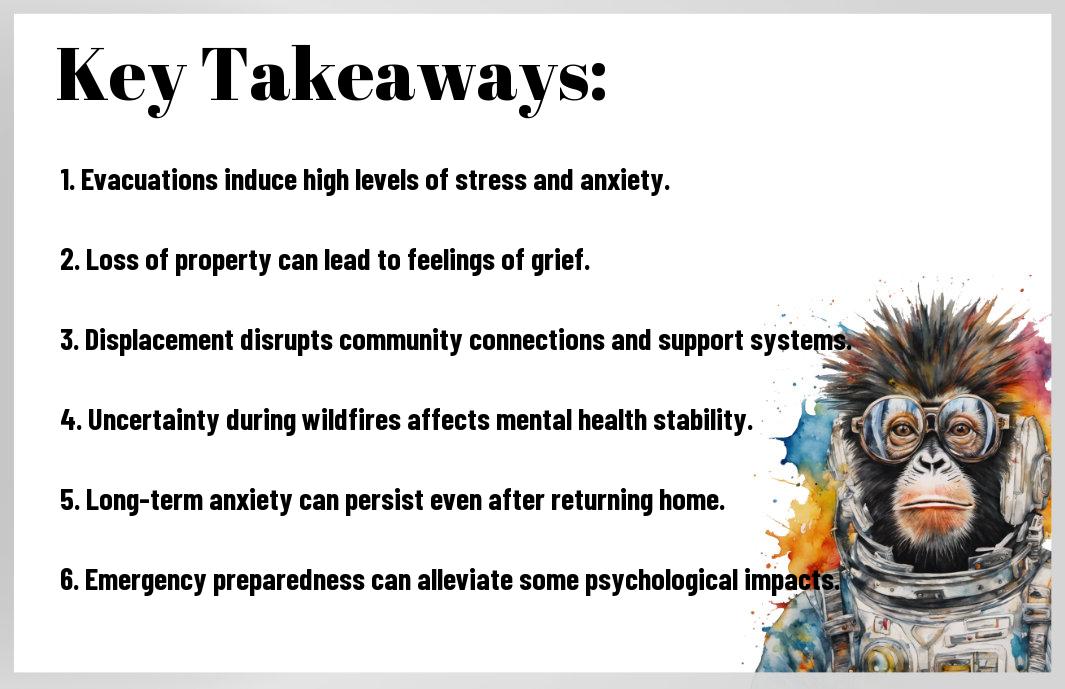Most people underestimate the psychological toll that wildfire evacuations can have on your mental health. The sudden need to leave your home can trigger a range of emotions, including anxiety, fear, and uncertainty, about the safety of your property and loved ones. While these events can lead to distressing thoughts, they can also foster resilience and community support among those affected. Understanding these psychological effects is vital for navigating the aftermath of such emergencies, ensuring both your well-being and that of your neighbors.
The Immediate Psychological Impact of Wildfire Evacuations
Before experiencing a wildfire evacuation, you may feel a sense of normalcy in your daily life. However, the moment an evacuation order is issued, this sense of security can rapidly dissipate, plunging you into uncertainty and fear. The sudden need to leave your home, often with little notice, can trigger a cascade of psychological effects that resonate long after the immediate danger has passed.
Acute Stress Responses
Along with the chaos of sudden evacuations, you might experience acute stress responses such as heightened anxiety, difficulty concentrating, and physical symptoms like increased heart rate. These intense reactions often stem from the overwhelming pressure of urgency, and the fear of loss associated with leaving behind your belongings and home.
Emotional Reactions
Wildfire evacuations can elicit strong emotional reactions that may vary from individual to individual. You might feel confused, frightened, or even guilt-ridden for leaving your home behind. These reactions can be exacerbated by the loss of control and disruption of your daily routine, leading to feelings of vulnerability in an unpredictable environment.
The emotional turmoil you might experience during a wildfire evacuation can include feelings of distress, anger, and grief, particularly as you grapple with the possibility of losing your home or belongings. Loss of community ties may heighten loneliness or isolation, compounding your emotional struggle. In this time of crisis, it’s vital to seek support from friends and family, as sharing your feelings can help to normalize your experience and foster resilience amidst the chaos.
Long-term Psychological Consequences
It is common for residents who experience wildfire evacuations to face long-term psychological effects, which can manifest in various ways. The abruptness of evacuation can lead to lingering feelings of uncertainty, loss, and fear, significantly impacting your mental health. Over time, these emotional responses can result in serious conditions like PTSD, anxiety, and depression that may require professional intervention and ongoing support to manage effectively.
Post-Traumatic Stress Disorder (PTSD)
To address the reality of PTSD, you may find that the trauma from evacuating can resurface long after the incident. Symptoms such as flashbacks, nightmares, and heightened anxiety can significantly impair your daily life, making it challenging to find a sense of normalcy.
Anxiety and Depression
Before delving into the complexities of anxiety and depression post-evacuation, it is crucial to understand how these conditions can take root in your life.
In addition to PTSD, anxiety and depression are prevalent in many wildfire evacuees. Following an evacuation, you may notice persistent worrying thoughts, irritability, and feelings of hopelessness. These conditions can stem from the trauma of leaving your home, uncertainty about your property’s safety, and the sense of loss associated with damaged or destroyed communities. The impact of these emotions can further complicate your routine, affecting everything from work to social relationships. Seeking support from professionals, community resources, or support groups can be significantly beneficial in addressing these challenges and promoting emotional recovery.
Coping Mechanisms During Evacuations
There’s no denying that evacuation situations can trigger significant stress and anxiety. To navigate these challenges, it’s vital to adopt effective coping mechanisms. Strategies like engaging in mindfulness exercises, maintaining open communication with loved ones, and creating structured routines can provide a sense of normalcy amidst the chaos. Taking proactive steps towards disaster preparedness not only alleviates uncertainty but also empowers you to face the unknown with resilience.
Community Support Systems
Any effective coping strategy during evacuations should include leveraging community support systems. Connecting with neighbors, local organizations, and social media groups can provide emotional comfort and practical assistance. These connections allow you to share resources and experiences, fostering a sense of unity and collective strength during a crisis.
Personal Resilience Strategies
Personal resilience strategies are imperative for maintaining mental well-being during evacuations. By engaging in self-care practices, setting realistic expectations, and focusing on what you can control, you can navigate the emotional turbulence more effectively.
Strategies such as establishing a personal emergency plan, staying informed about evacuation protocols, and keeping a go-bag ready can help you feel more prepared. Practicing deep breathing and mindfulness techniques can keep your stress in check, while reaching out to trusted friends or professionals allows for emotional support. Focus on positive self-talk and limitations you can manage; recognizing your strengths can enhance your ability to cope during these difficult times.
The Role of Communication in Reducing Psychological Distress
Unlike many natural disasters, wildfires often necessitate quick evacuations that can significantly elevate psychological distress. The importance of effective communication during these crises cannot be overstated; clear messaging can help you understand the situation and the steps you need to take, ultimately reducing anxiety and uncertainty. When authorities convey timely and accurate information, you can better prepare and make informed decisions, which fosters a sense of control in an otherwise chaotic situation.
Information Dissemination
After a wildfire is reported, the speed and clarity of information dissemination play a pivotal role in evacuation success. When emergency services provide updates through various channels—such as television, radio, and official websites—this helps you stay informed about evacuation orders and safety measures. Properly disseminated information not only conveys what actions to take but also reassures you that the authorities are effectively managing the crisis.
Social Media Influence
On the other hand, social media platforms have become vital channels for real-time updates during wildfire evacuations. They allow you to access information in a more dynamic and interactive way, connecting you with both official announcements and community support. However, navigating the vast amount of information can sometimes lead to confusion or misinformation.
Understanding the role of social media during wildfire evacuations can greatly impact your awareness and decision-making. While it provides immediate access to updates, it’s necessary to verify information through trusted sources to avoid panic or misinformation. Social media’s positive aspects include fostering community connections and support networks, but it can also amplify feelings of fear when misinformation spreads. Staying engaged with reputable sources can help balance these influences, offering a clearer picture and helping you maintain a sense of calm during uncertainty.
Vulnerable Populations and Unique Challenges
Many residents face unique challenges during wildfire evacuations, particularly those from vulnerable populations such as the elderly, disabled, and families with children. Understanding how to support these groups is vital for effective response and recovery strategies. Resources for addressing anxiety, PTSD, survivors guilt, and more | News can help in mitigating the psychological effects of such stressful situations.
Elderly and Disabled Residents
After a wildfire evacuation, elderly and disabled residents often encounter barriers that heighten their distress. This group may struggle with mobility, cognitive challenges, and a lack of social support, making evacuations particularly overwhelming and disorienting.
Families with Children
Between evacuating with children and managing their emotional reactions, families may experience amplified stress during wildfires. Children often have difficulty processing the fear and uncertainty associated with evacuations, which can lead to long-lasting emotional impacts.
Hence, you should provide your children with age-appropriate information about the wildfire and reassure them of their safety. Engaging them in the evacuation process can foster a sense of control, while maintaining routines—like keeping familiar items close—helps reduce anxiety. Supporting your child’s emotional needs can aid in easing their fear and uncertainty, paving the way for recovery after a distressing experience.
Strategies for Mental Health Support
Now, implementing effective mental health support strategies can significantly enhance your ability to cope with the emotional toll of wildfire evacuations. Engaging in community support initiatives, participating in mental health workshops, and seeking professional counseling are all vital actions that empower you to navigate the psychological landscape of such traumatic experiences.
Pre-evacuation Planning
By preparing for potential wildfires well in advance, you can reduce anxiety and uncertainty. Create a comprehensive evacuation plan that includes not just logistical details, but also strategies for emotional resilience. Discuss this plan with your family and community, ensuring everyone feels involved and informed.
Post-evacuation Counseling Services
Against the backdrop of post-evacuation chaos, accessing counseling services can provide you with the support needed to process your experience. Connecting with a mental health professional can help you explore feelings of loss, stress, and fear.
The availability of post-evacuation counseling services is important for residents grappling with the aftermath of wildfires. These services often include individual therapy, support groups, and workshops designed to help you articulate your feelings and develop coping skills. Implementing these support systems is not only about healing; it fosters a sense of community as you share experiences with others facing similar challenges. Engaging in these programs can ultimately transform your recovery journey into one of resilience and renewed hope.

To wrap up
Taking this into account, understanding the psychological effects of wildfire evacuations on residents like you is vital for fostering resilience and recovery. The intense stress, uncertainty, and potential for trauma can deeply impact your mental health and well-being. By acknowledging these challenges and building support systems within your community, you can better navigate the emotional aftermath of such experiences. Ultimately, being aware of how evacuations affect you and your loved ones allows you to seek the necessary support and resources to heal and rebuild.









